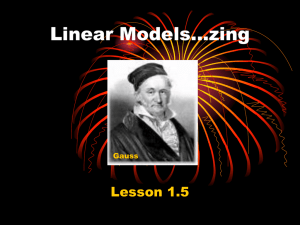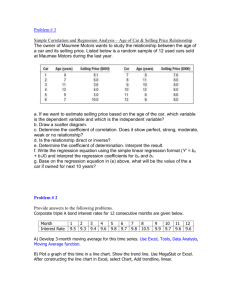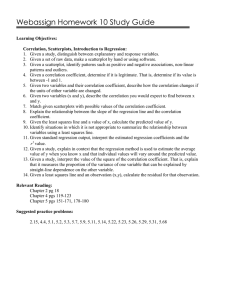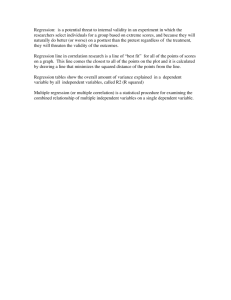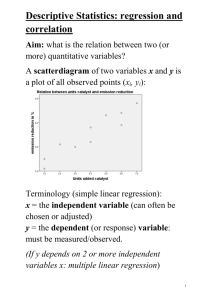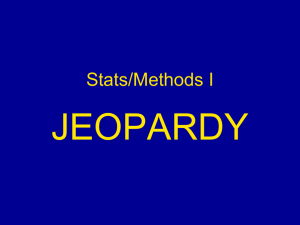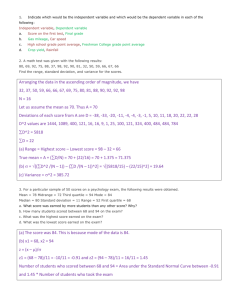Linear Correlation and Regression Relationship is assumed to be linear
advertisement
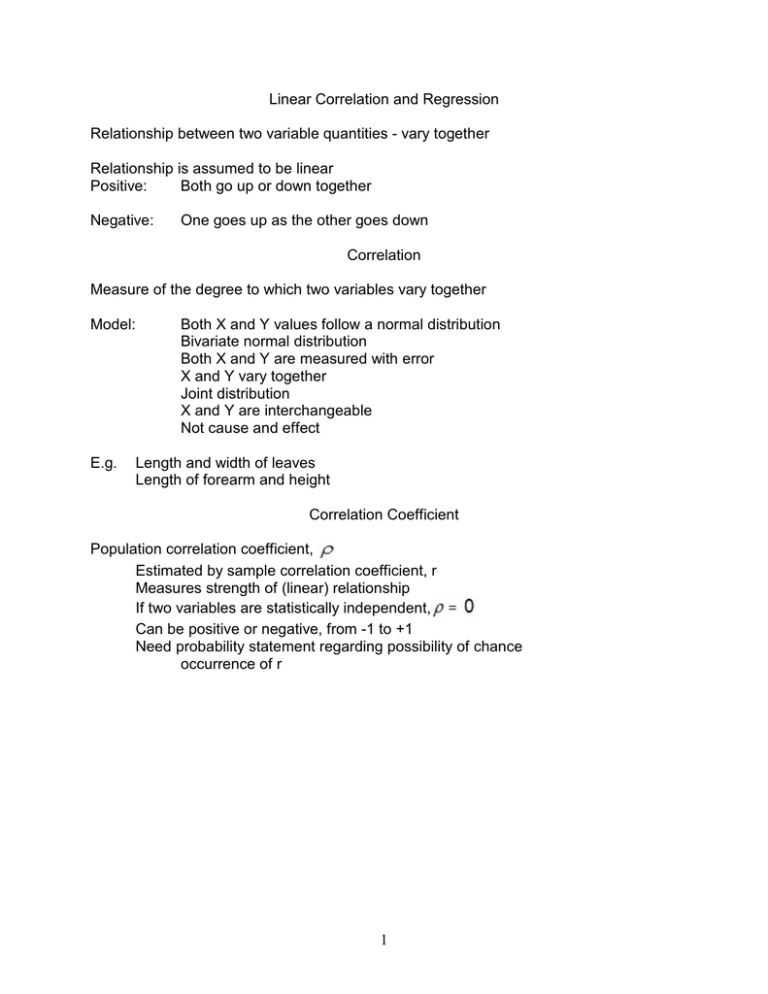
Linear Correlation and Regression Relationship between two variable quantities - vary together Relationship is assumed to be linear Positive: Both go up or down together Negative: One goes up as the other goes down Correlation Measure of the degree to which two variables vary together Model: E.g. Both X and Y values follow a normal distribution Bivariate normal distribution Both X and Y are measured with error X and Y vary together Joint distribution X and Y are interchangeable Not cause and effect Length and width of leaves Length of forearm and height Correlation Coefficient Population correlation coefficient, Estimated by sample correlation coefficient, r Measures strength of (linear) relationship If two variables are statistically independent, Can be positive or negative, from -1 to +1 Need probability statement regarding possibility of chance occurrence of r 1 Correlation Coefficient Values 2 Regression Measures amount of change in dependent variable per unit change in independent variable Model: E.g. X values are fixed or measured without error Independent variable Y follows a normal distribution Dependent variable Y varies with X Relationship assumed to be linear Magnitude of dependent variable (y-axis) depends on magnitude of independent variable (x-axis) Rates of N and yields. Rates of N considered as fixed. 3 Regression Assumptions Independent variable X is fixed (controlled or measured without error) Dependent variable Y contains error or variability Y is sampled from a normally distributed population Errors in Y: are independent have constant variance F2,, independent of X have a mean of 0, independent of X are normally distributed Relationship is linear 4 Appropriate Uses 1. To find the amount of change in Y per unit change in X 2. To test for a cause-effect relationship between X and Y Mathematical model For multiple measurements of Y, errors cancel, so Cause and effect Correlation is not sufficient to show cause and effect, e.g. age and number of grandchildren Regression is not sufficient to show cause and effect, e.g. amount of manure and crop response. Need confirming research on nutrient uptake. Improved growth could be due to manure effect on nematodes in the soil and not a direct effect. For cause and effect show that: Variables are related Relationship is dose-dependent Response is absent in absence of cause Direct physical method of response, eg uptake, receptor Coefficient of Determination Coefficient of determination, r2 Not bivariate normal distribution, r has no meaning Square of r Positive, from 0 to 1 Represents the proportion of the total treatment SS accounted for by regression. r2 coefficient of simple determination Y vs X R2 coefficient of multiple determination Y vs X1, X2, X3, etc. 5 Calculation of coefficient of linear correlation, r SP can be either positive or negative. Test of Significance Null hypothesis Ho: = 0 is that variables are independent. The test statistic (with n - 2 degrees of freedom) is: This is a two-tailed test. Involves only n and r. Can look up r for the appropriate degrees of freedom in a table. t statistic can be used to calculate confidence limits. Value of Correlation Coefficient, r, for Significance Degrees of freedom Probability of obtaining a value as large or larger 0.1 0.05 0.01 0.001 1 .9879 .9969 .9999 1.0000 2 .9000 .9500 .9900 .9990 3 .8054 .8783 .9587 .9912 4 .7293 .8114 .9172 .9741 6 5 .6694 .7545 .8745 .9507 6 .6215 .7067 .8343 .9249 7 .5822 .6664 .7977 .8962 8 .5494 .6319 .7646 .8721 9 .5214 .6021 .7348 .8471 10 .4973 .5760 .7079 .8233 Calculation of coefficient of determination, r2 Degrees of Freedom for r and r2 Source df Total n-1 Regression 1 Error n-2 7 Regression Line b is the expected change in Y for a unit change in X r2*100% is the percentage of the variation accounted for by the regression 8 Regression as Orthogonal Contrast Regression in Replicated Experiments ANOVA Source df Total rt-1 Block r-1 Treatment t-1 SS as usual Regression 1 r2*SSTrt Deviation from Regression t-2 (1-r2)*SSTrt = SSTrt - SSRegr Error (r-1)(t-1) Use MSE for F-test for both MSRegr and MSDev 9
